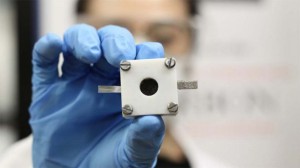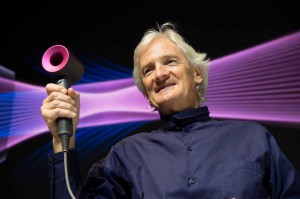Stop me if you’ve heard this one: a quirky entrepreneur decides to get into the automotive business by developing an electric vehicle, even though he has no real experience in that arena. The grand plan calls for three vehicles to anchor the company.
Sound familiar?
Yes. But it’s not Elon Musk and Tesla, but rather James Dyson, the famous inventor of the Dyson vacuum and many other products. Dyson recently revealed plans to produce an EV using a solid state batteries rather than the lithium ion panels currently used by automakers.
The first car, which Dyson revealed was coming late last year, is tracking to arrive before 2020. The limited-edition model, which will be about 10,000 units, will be premium-priced vehicle, although not a sports, Dyson said earlier. It will essentially provide the company with a blueprint for how to make the other two models, according to Financial Times.
(Dyson blowing into EV car segment like a cyclone. Click Herefor the story.)

A new solid state battery cell offers a wealth of advantages over the current lithium ion technology.
Again, sound familiar? The next two models, which will have more mass-market appeal and pricing, will follow.
In reality the big change is the move from solid state batteries, which are view as next leap forward in battery technology, back to lithium ion power packs. Another source, according to AutoCar.com, says solid states will be used in the next two vehicles.
While another eclectic entrepreneur jumping into the auto industry is an interesting story, Dyson’s plans to use solid state batteries would have been a big differentiator for any vehicle the start-up company developed.
Solid-state battery packs have a higher energy density and are quicker to charge than liquid cells, cooler while operating and potentially more powerful. Toyota is the only manufacturer with firm plans to introduce the technology in the coming decade, while Porsche has hinted that solid-state EVs are in its product plans. BMW has also partnered with a solid-state battery company in its effort to adopt the technology.
There was good reason to believe that Dyson planned to make good on that point as he’d hired Anne Marie Sastry, purchasing her battery company, Sakit3, which was developing new battery technologies, including the solid state versions for different uses.
However, Sastry is no longer with Dyson’s company, according to a spokesperson, leaving the program in limbo, at least in terms of a timeline for producing a viable solid-state battery for the burgeoning automaker.
(Click Here for more about the push for solid state batteries.)
Dyson’s got a team of more than 400 employees working on the project, and has for nearly three years, he said last fall. He notes that his company’s expertise in solid-state battery technology and electric motors prevalent in his vacuum cleaners, bladeless fans and air purifiers is excellent preparation for producing an EV with an as-yet-viable battery.
“Battery technology is very important to Dyson, electric motors are very important to Dyson, environmental control is very important to us,” Dyson told Reuters. “I have been developing these technologies consistently because I could see that one day we could do a car.”
The company is looking for a home, he noted, adding it will likely be near wherever the suppliers for the new machine will be. He also said that the exterior design would be different than other EVs on the road, although it will not be a sports car.
Additionally, if you’re looking for a bargain vehicle, you’ll be disappointed as he said it will “not be a very cheap car.” He didn’t eliminate any potential markets for the vehicle, but he did note that “we see a very large market for this car in the Far East.”
However, Dyson does have one clear idea about his venture: he’s not working with a large automaker. The 71-year-old executive had a bad experience with automakers when he approached them about an idea he had for vehicle exhaust using the same cyclonic technology used in his vacuum cleaners nearly 30 years ago.
“We are not a johnny-come-lately onto the scene of electric cars,” he told Reuters. “It has been my ambition since 1998 when I was rejected by the industry, which has happily gone on making polluting diesel engines, and governments have gone on allowing it.”
(To see how mass EV charging could cause problems, Click Here.)
Dyson revealed the project only because it was getting increasingly more difficult to recruit new employees for the project without revealing the nature of the project. He told the 1,000-plus employees in his company via email that the project was a go, and his message also reflected his inherent distrust of the industry.

